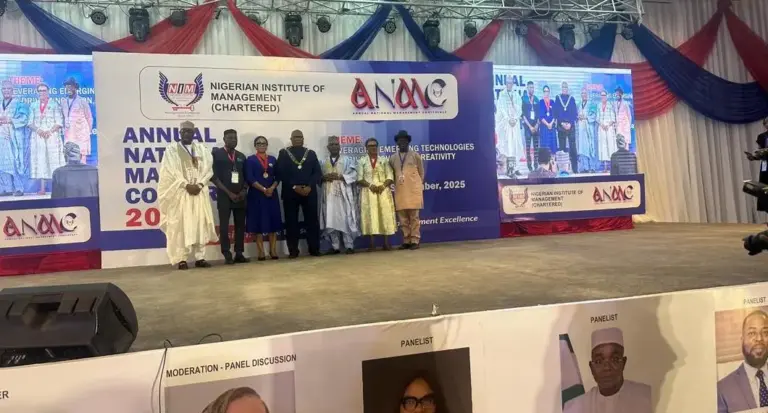Nigeria’s managers, policymakers, and business leaders are being urged to move beyond rhetoric and take decisive steps in harnessing emerging technologies to transform the nation’s economy. This was the central message at the 2025 Annual National Management Conference of the Nigerian Institute of Management (Chartered), NIM, which opened in Abuja on Monday.
The three-day gathering, themed “Leveraging Emerging Technologies to Drive Innovation, Creativity and Productivity,” brought together voices from government, academia, business, and international partners to chart a roadmap for a tech-driven Nigeria.
“Technology Is Everything”
In his opening remarks, Abimbola Ayuba, President and Council Chairman of NIM, said the institute deliberately focused on artificial intelligence, robotics, and biotechnology because Nigeria risks being left behind if it does not act with urgency.
“Technology is everything, and every forward-looking nation that wants to go the distance must leverage emerging technologies,” Ayuba said, stressing that corruption and lack of discipline remain barriers to national progress.
He called on professionals across sectors to model transparency, accountability, and efficiency in their workplaces, arguing that sustainable national growth cannot take place without integrity.
Government Signals Commitment
Representing the federal government, Michael Yenge, on behalf of the Secretary to the Government of the Federation, said Nigeria is uniquely positioned for a digital leap due to its young population and expanding digital economy.
He highlighted President Bola Tinubu’s ongoing initiatives such as the Nigeria Startup Act, the creation of a Ministry of Communications, Innovation and Digital Economy, and investments in broadband expansion, digital skills, and tech entrepreneurship.
“In today’s rapidly evolving world, technology is no longer a distant enabler; it is the very foundation of national competitiveness and institutional relevance,” Yenge noted.
Nigerians Already Shaping Global Tech
Delivering the keynote, Mike Egboh, Country Director of Chemonics GHSE-PSM Project Nigeria, reminded delegates that Nigerians are already excelling globally in robotics and advanced engineering, particularly in Silicon Valley.
“The best robotic engineers in the US today are Nigerians,” Egboh said, while urging the creation of a national digital innovation framework anchored on:
-
sector-specific policies for AI and blockchain,
-
massive investment in broadband and data infrastructure,
-
strong startup financing and mentorship, and
-
expansion of internet access to rural areas.
He warned that inaction comes with steep costs, but argued that with the right policies Nigeria could build global competitiveness while tackling local challenges.
Broadening the Conversation
Panellists at the conference—including academics, policymakers, and industry experts—also spotlighted:
-
youth leadership development to address migration-driven leadership gaps,
-
ageing and retirement care for senior managers, and
-
the role of education reform in embedding technology.
Mohammed Santuraki, Pro-Chancellor of the Federal University of Technology, Minna, stressed embedding tech into both governance and education systems, while others called for inclusive policies to ensure women, people with disabilities, and underserved groups are not left out of the digital economy.
Towards Actionable Strategies
With over 200,000 members nationwide, NIM describes its annual conference as its flagship dialogue platform. Since 1961, it has provided policy advice on economic management, human resource development, and leadership.
As the 2025 edition continues, Ayuba expressed optimism that participants will deliver practical recommendations on how Nigeria can leapfrog into a knowledge-based economy powered by innovation.
“We must all resolve to bring discipline, effectiveness, probity, and transparency to our lives, our workplaces, and our nation. Only then can we unlock the aggregates of national development,” he concluded.

